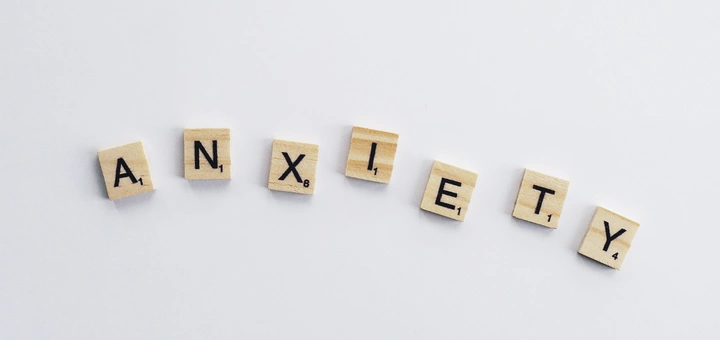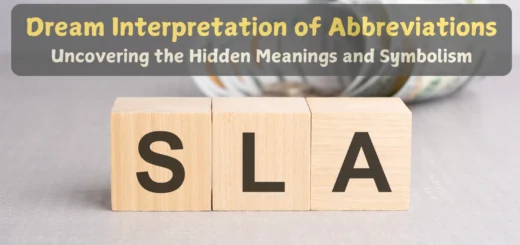Dream Interpretation of Anxiety
Dreaming about anxiety often reflects the stress and emotional pressure you’re experiencing in your waking life. If you’re feeling overwhelmed, tense, or out of control in a dream, it could be your subconscious mind trying to process these feelings. Dreams about anxiety can manifest in various ways—whether it’s being chased, losing control, or facing a looming deadline. These dreams may indicate that you’re grappling with fears, insecurities, or uncertainties in your waking life. It could also be a sign that you need to confront something that you’ve been avoiding, whether it’s a decision, responsibility, or relationship. In some cases, anxiety dreams might appear when you’re going through transitions or facing unknowns, signaling the need for reassurance or a greater sense of stability. By exploring the emotions tied to these dreams, we can better understand the root of your anxiety and find ways to ease it in your waking life. In this article, we’ll explore the significance of anxiety-related dreams and how they can guide you in addressing the sources of stress and emotional tension.

Understanding the Basics: What Does Anxiety Represent in Dreams?
Anxiety in a dream can represent various aspects of our lives, including:
- Reflection of Waking Life Stress: Anxiety dreams can mirror the stress and pressures we face in our daily lives.
- Unresolved Conflicts: Anxiety can symbolize unresolved conflicts or issues that need attention and resolution.
- Fear of the Unknown: Anxiety dreams can signify a fear of the unknown or uncertainty about the future.
- Self-Reflection and Personal Growth: Anxiety can represent a need for self-reflection, personal growth, and a deeper understanding of oneself.
Psychological Analysis: Carl Jung and Sigmund Freud
From a psychological perspective, Carl Jung and Sigmund Freud offer valuable insights into the symbolism of anxiety in dreams.
Carl Jung’s Perspective
According to Jung, anxiety in a dream can represent the process of individuation, which is the integration of the opposites (e.g., conscious and unconscious, rational and emotional) to become a whole and balanced individual. This can indicate a need to explore our creative potential, develop our personality, and achieve self-awareness.
Sigmund Freud’s Perspective
Freud might interpret anxiety in a dream as a symbol of repressed desires or unconscious thoughts. This can suggest that our subconscious is trying to communicate with us, revealing hidden fears, anxieties, or unfulfilled desires.
Religious and Cultural Perspectives
Anxiety has different meanings in various religious and cultural contexts.
Biblical Perspective
In the Bible, anxiety is often associated with faith and trust in God. Dreaming of anxiety in a biblical context can signify a need for spiritual guidance, faith, and a deeper understanding of one’s relationship with God.
Islamic Perspective
In Islam, anxiety is considered a test of faith and a reminder to trust in Allah’s plan. Dreaming of anxiety in an Islamic context can represent a need for spiritual growth, self-reflection, and a deeper understanding of one’s faith.
Hindu Perspective
In Hinduism, anxiety is associated with karma and the law of cause and effect. Dreaming of anxiety in a Hindu context can signify a need for self-reflection, personal growth, and a deeper understanding of one’s actions and their consequences.
Different Aspects of Anxiety: Symbolism and Meaning
Various aspects of anxiety can have distinct meanings in dreams.
- Social Anxiety: represents a fear of judgment, rejection, or not fitting in.
- Performance Anxiety: signifies a fear of failure, inadequacy, or not meeting expectations.
- Generalized Anxiety: represents a pervasive sense of worry, unease, or uncertainty.
- Separation Anxiety: signifies a fear of loss, abandonment, or being alone.
Common Dream Scenarios: Interpretations and Insights
Here are some common dream scenarios involving anxiety, along with their possible interpretations:
- Dreaming of Social Anxiety: indicates a fear of judgment, rejection, or not fitting in.
- Dreaming of Performance Anxiety: represents a fear of failure, inadequacy, or not meeting expectations.
- Dreaming of Generalized Anxiety: signifies a pervasive sense of worry, unease, or uncertainty.
- Dreaming of Separation Anxiety: represents a fear of loss, abandonment, or being alone.
FAQs About Dreams Related to Anxiety
- Q: What does it mean to dream about feeling anxious?
A: Dreaming about feeling anxious often reflects your waking-life concerns or unresolved stress. It may also signify internal conflicts or fears that need addressing in your personal or professional life.
- Q: Why do I frequently have anxiety dreams?
A: Recurring anxiety dreams may indicate chronic stress or ongoing challenges in your life. They could also suggest that your subconscious mind is trying to process unresolved emotions or trauma.
- Q: What does it mean to dream about being late and feeling anxious?
A: This dream often symbolizes fears of failure or a lack of preparation. It may also highlight feelings of pressure to meet deadlines or expectations in your waking life.
- Q: What does dreaming about an anxiety attack mean?
A: Dreaming of having an anxiety attack could represent overwhelming emotions, a lack of control, or an upcoming event that is causing you significant worry or tension.
- Q: Can anxiety dreams be related to health issues?
A: Yes, anxiety dreams can sometimes reflect physical or mental health issues, such as heightened stress levels, sleep disorders, or unresolved health concerns. It’s essential to monitor your well-being and seek professional advice if needed.
- Q: What does it mean to dream about being in a dangerous or chaotic situation?
A: This type of dream may represent your feelings of insecurity or fear in your waking life. It could also signify your mind’s attempt to process challenging or unsettling situations.
- Q: Are anxiety dreams more common in certain people?
A: People who experience high stress, have anxiety disorders, or are going through significant life changes are more likely to have anxiety dreams. Personality traits like perfectionism can also contribute.
- Q: What does it mean to dream about losing control and feeling anxious?
A: Dreams about losing control often symbolize fear of the unknown or a sense of helplessness in real life. They may reflect your struggle to manage overwhelming responsibilities or emotions.
- Q: Can anxiety dreams have positive meanings?
A: While anxiety dreams often feel negative, they can serve as a wake-up call to address important issues in your life. They may also reflect your drive to overcome challenges or improve yourself.
- Q: What does it mean to dream about a test and feeling anxious?
A: Dreams about tests often represent your fear of judgment or performance-related anxiety. They may also indicate a need to evaluate yourself or prepare for a significant challenge.
- Q: How can I reduce anxiety dreams?
A: Managing stress, practicing relaxation techniques, and maintaining a consistent sleep schedule can help reduce anxiety dreams. Journaling your thoughts and emotions before bed may also help alleviate subconscious worries.
- Q: What does it mean to dream about being chased and feeling anxious?
A: Being chased in a dream can symbolize avoidance or fear of confrontation in your waking life. It often reflects unresolved issues or emotions you’re trying to escape.
- Q: Why do anxiety dreams feel so real?
A: Anxiety dreams feel vivid because they are closely linked to your emotions and subconscious mind. Stress and heightened emotions during the day can make these dreams more intense and memorable.
- Q: What does it mean to dream about public speaking and feeling anxious?
A: Dreams about public speaking often reflect fears of embarrassment, judgment, or failure. They may also highlight a lack of confidence in expressing yourself or handling social situations.
- Q: Can anxiety dreams predict future problems?
A: Anxiety dreams don’t predict the future but can indicate unresolved issues or stressors in your current life. They can serve as an opportunity to reflect on and address these concerns.
- Q: What does it mean to dream about losing something and feeling anxious?
A: This type of dream often reflects fears of loss, insecurity, or feeling unprepared. It may also symbolize emotional attachment to something or someone in your life.
- Q: Can anxiety dreams be influenced by daily stress?
A: Yes, daily stress and unresolved issues significantly contribute to anxiety dreams. Your mind processes these emotions during sleep, resulting in vivid or distressing dreams.
- Q: Why do I wake up feeling anxious after a dream?
A: Waking up anxious after a dream is common and may result from heightened emotions or unresolved stress. It’s your mind’s way of signaling that you may need to address these feelings in your waking life.
- Q: What does it mean to dream about being lost and feeling anxious?
A: Dreams about being lost often symbolize confusion, lack of direction, or feelings of insecurity. They may reflect your uncertainty about a situation or decision in your waking life.
Conclusion
Dreams about anxiety can be complex and multifaceted, revealing hidden aspects of our psyche, emotions, and experiences. By exploring the psychological, cultural, and spiritual meanings of anxiety in dreams, we can gain a deeper understanding of ourselves and the world around us. Remember that dreams are personal and subjective, and the interpretation of anxiety in dreams can vary depending on your individual experiences and perspectives.
Additional Information:
Whether you searched for dream interpretation of anxiety, meaning of dreaming anxiety, Biblical meaning of anxiety in dream, anxiety dream meaning, or asked what does it mean when you dream about anxiety, these insights are here to guide you. Our "anxiety dream meaning" page aims to help you understand your subconscious experiences. As always, consider your personal context and emotions for a more accurate interpretation.
Personalized Dream Interpretation
As a professional dream analyst, I want to remind you that every dream is deeply personal. Factors such as your current mood, recent life events, past experiences, personal relationships, and even changes in your health can all influence what a dream means to you. If the interpretation provided here does not fully address your personal circumstances or leaves you with lingering questions, please feel free to share more details in the comments. By understanding the context of your life and emotions, we can work together to arrive at a more accurate and meaningful interpretation tailored uniquely to you.
















